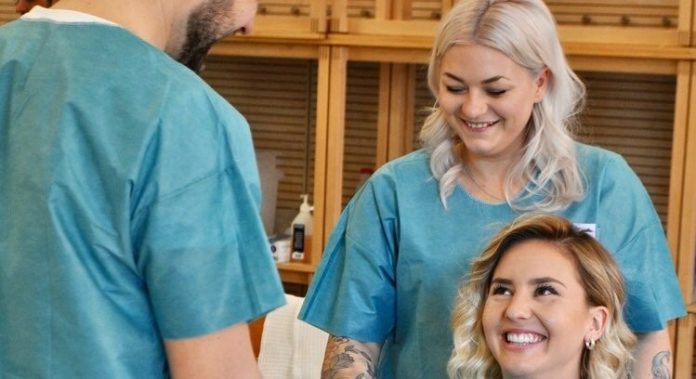While airplanes are grounded during the COVID-19 pandemic, aviation staff are queuing to assist in healthcare. Many Scandinavian Airlines (SAS) staff who have lost their jobs have undergone training to join the fight against the corona crisis.
“It feels great to be able to contribute,” says Malin Öhman, one of SAS’s employees, who is now working to support the healthcare sector.
The aviation industry has been seriously disrupted by the COVID-19-pandemic. SAS has had to dismiss up to 10 000 employees because of the huge reduction in passenger numbers. But there is now an alternative for the dismissed staff – they have the opportunity to step in to ease the pressure in the healthcare sector.
Malin Öhman has worked for SAS for over three years. She had noticed the fall in passenger numbers and been told by the company of the serious impact on the aviation industry. But then she received a positive email about how she could contribute to healthcare.
“We got an email from SAS about the training that was sent out to all the staff in Stockholm. The flight demand had gone down incredibly,” Malin told UNRIC.
 Thanks to the efforts of the recruitment company Novare, the Wallenberg Foundation and Sophiahemmet University in Stockholm, dismissed SAS-staff were offered training in the basics of healthcare, such as how to make beds and how to clean and disinfect materials. Malin explains that there were a lot of people who signed up for the training.
Thanks to the efforts of the recruitment company Novare, the Wallenberg Foundation and Sophiahemmet University in Stockholm, dismissed SAS-staff were offered training in the basics of healthcare, such as how to make beds and how to clean and disinfect materials. Malin explains that there were a lot of people who signed up for the training.
After she signed up, everything went very fast. The training only took a few days and was partly digital. Some parts were practical, where they had to be very aware of the distance between the students. “We were separated into smaller groups and had to observe physical distancing during the training to avoid the risk of being infected.”
Malin now helps to transport patients infected with COVID-19. “It’s an initiative of the ambulance services in Stockholm. We are working to ease their burden. You could say that we are an extension of the ambulance service. We call ourselves the “corona-express,” Malin says and laughs.
The work of a flight attendant has given Malin valuable experience which she has been able to draw on while working with patients. “Most of the people in the aviation industry have had to deal with sick passengers on board, and we are responsible for dealing with the situation. We are the first people on the scene and have to judge what should be done, which is an experience that has been useful to me while working with infected patients.”
“It’s very extraordinary to work with my colleges from SAS, but in a completely different environment. We are so used to seeing each other in an air steward uniforms, and now we are in a completely different role.”
 Malin describes that everything happened so suddenly, from being unemployed in the aviation industry, to being in the epicentre of the pandemic. “My colleagues and I talk about it sometimes and ask each other ‘how did we end up here?’. It’s a peculiar feeling. But at the same time, it feels fantastic.”
Malin describes that everything happened so suddenly, from being unemployed in the aviation industry, to being in the epicentre of the pandemic. “My colleagues and I talk about it sometimes and ask each other ‘how did we end up here?’. It’s a peculiar feeling. But at the same time, it feels fantastic.”
Like many other European countries, Sweden has a shortage of employees in the health care sector and the situation has become more evident during the COVID-19 pandemic. While many people in other sectors are losing their jobs, health care workers are needed more than ever.
“It feels great to be able to contribute; we get a lot of positive feedback and a lot of appreciation for what we do. It feels like we are contributing to something valuable. The work is also very hands-on and very practical, so you can see the difference that we make,” Malin says.
Additional links:




